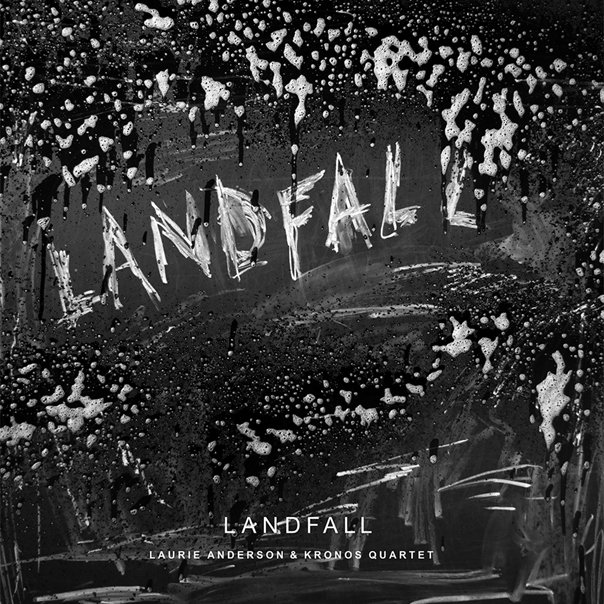ALBUM REVIEW: Laurie Anderson and Kronos Quartet illustrate effects of natural disaster on Landfall

Tragedy brings out both the best and the worst in people. From the worst events in people’s lives, there is always opportunity to grow, and to become something greater. In the case of folk singer-songwriter Laurie Anderson, tragedy was her muse. Drawing inspiration from her experiences during Hurricane Sandy, Anderson recruited the help of long-time symphonic Bay Area avant-garde troupe Kronos Quartet. Through their collaboration they found a way to immortalize her story on their new album, Landfall.
Landfall
Laurie Anderson and Kronos Quartet
Feb. 16
The album starts off on an ominous tone. On the track “CNN Predicts a Monster Storm,” we begin our journey down this dark and intriguing rabbit hole. A violin sets the mood for the first few bars before a cello comes in to support. The piercing piece, which could score the opening of a Kubrick film, leaves listeners feeling raw, and if nothing else, this is music that is difficult to listen to alone at night. Why? Because the emotions the song conveys lose no power after several listens, allowing listeners to truly see the fright and uncertainty that must have befallen those who lived through the superstorm.
On “The Water Rises,” the music starts to become more psychedelic, and also easier to digest. The introduction is modern, not unlike OK Computer-era Radiohead, with an almost electronic tone. It draws attention and showcases the quartet’s commitment to finding the balance between the classical and the contemporary, but does provoke a line of thought that would draw attention from the the story the music is creating. It does all this without sounding pretentious.
Following three overtures, the fourth—of 30, yes 30—songs, is “Our Street Is a Black River,” on which Laurie Anderson makes her first appearance. Her monologue over the quartet’s support makes the song feel personal. But it’s not until her next vocal appearance, on “Dreams,“ that listeners are able to comprehend the weight of her soliloquies. The piece is a perfect example of finding and conveying beauty in everyday life, and the avant-garde style for which both contributing parties are known. As Anderson recites an experience of begrudgingly listening to another person’s dream, it is hard not to feel connected to her experiences and state of mind.
For the most part, the songs are relatively short, usually ranging around two or three minutes. The exception is “Nothing Left but Their Names,” which is longer than nine minutes and emphasizes how important this idea is to Anderson. The piece reminds listeners of our own mortality, unquestionably a topic she could not push out of her mind during this time in her life. The orchestral flow allows us to get lost in the thoughts the monologue inspires. Over the music, she discusses a book she read, detailing animals that are now gone, citing the statistic that “99 percent of all species that have ever lived are now extinct,” leading listeners to question the significance of our time on this planet.
All along the journey, Kronos Quartet provides the soundtrack to Anderson’s stories. They inform listeners how to feel when words are not enough: Sending chills down your spine on “CNN Predicts a Monster Storm,” creating a feeling of emptiness on “All the Extinct Animals” and provides escape on “Old Motors and Helicopters,” with its metronomic backbone that sets the tones and creates a feeling of consistency of tempo and mood.
That concluding track provides a closure that is more realistic than fairy tale, but still manages to find beauty in a tragic situation. Anderson recalls the sight of going down into he basement to find the majority of her worldly possessions destroyed, but still manages to put this in a positive and constructive context. Says Anderson, in a monologue: “I looked at them floating there in the shiny dark water, dissolving/ All the things I had carefully saved/ All my life becoming nothing but junk/ And I thought, how beautiful.” A distinctive throttle of helicopter blades cutting through the air signifies the end of her time among the wreckage. While it might have taken Laurie Anderson a while to find the right way to tell this story, one thing that is certain is she could not have done it better.
Follow writer Nick Gumas at Twitter.com/NickGGumas.
